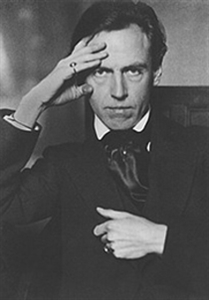Cyril Scott
Cyril Scott (27 September 1879 – 31 December 1970) was an English composer, writer, and poet, known for his contribution to early 20th-century music and literature. His work, which includes operas, symphonies, chamber music, and solo piano pieces, is characterized by its blend of romanticism and impressionism, making him a pivotal figure in the transition between the two movements in English music.
Biography[edit | edit source]
Cyril Scott was born in Oxton, Cheshire, to a shipowner and his wife. He showed early musical talent and was sent to study at the Frankfurt Conservatory at the age of 12, where he became part of a group of composers known as the Frankfurt Group, alongside Percy Grainger, Roger Quilter, and Norman O'Neill. This group was influential in the development of a new direction for English music, moving away from the Germanic tradition that had dominated.
After returning to England, Scott embarked on a career as a composer and pianist. His compositions gained attention for their innovative harmonies and rhythms, and he was soon recognized as a leading figure in British music. His opera The Alchemist (1915) and his Piano Concerto No. 1 (1914) are among his best-known works.
In addition to his musical career, Scott was a prolific writer. He authored several books on philosophy, health, and music theory, reflecting his interest in theosophy and alternative medicine. His writings contributed to the early 20th-century spiritual and cultural movements, making him a notable figure outside the realm of music as well.
Musical Style and Influence[edit | edit source]
Cyril Scott's music is often described as a blend of romanticism and impressionism, with a distinctive use of melody and harmony that set his compositions apart from his contemporaries. He was influenced by the works of Claude Debussy and Richard Wagner, but his style remained uniquely his own, marked by lush harmonies and an innovative approach to form and structure.
Scott's influence extended beyond his compositions. He was a mentor to younger composers and a champion of new music, advocating for the performance and recognition of contemporary works. His efforts helped pave the way for the acceptance of modernist music in Britain.
Legacy[edit | edit source]
Cyril Scott's contributions to music and literature were somewhat overshadowed by the advent of more radical modernist movements in the mid-20th century. However, in recent years, there has been a resurgence of interest in his work, with new recordings and performances of his compositions. His music is now recognized for its role in the development of English music in the early 20th century, and his writings continue to be of interest for their insights into the cultural and spiritual movements of his time.
Selected Works[edit | edit source]
- The Alchemist (Opera, 1915)
- Piano Concerto No. 1 (1914)
- Symphony No. 2 (1903)
- Lotus Land (Piano Solo, 1905)
See Also[edit | edit source]
Search WikiMD
Ad.Tired of being Overweight? Try W8MD's physician weight loss program.
Semaglutide (Ozempic / Wegovy and Tirzepatide (Mounjaro / Zepbound) available.
Advertise on WikiMD
|
WikiMD's Wellness Encyclopedia |
| Let Food Be Thy Medicine Medicine Thy Food - Hippocrates |
Translate this page: - East Asian
中文,
日本,
한국어,
South Asian
हिन्दी,
தமிழ்,
తెలుగు,
Urdu,
ಕನ್ನಡ,
Southeast Asian
Indonesian,
Vietnamese,
Thai,
မြန်မာဘာသာ,
বাংলা
European
español,
Deutsch,
français,
Greek,
português do Brasil,
polski,
română,
русский,
Nederlands,
norsk,
svenska,
suomi,
Italian
Middle Eastern & African
عربى,
Turkish,
Persian,
Hebrew,
Afrikaans,
isiZulu,
Kiswahili,
Other
Bulgarian,
Hungarian,
Czech,
Swedish,
മലയാളം,
मराठी,
ਪੰਜਾਬੀ,
ગુજરાતી,
Portuguese,
Ukrainian
Medical Disclaimer: WikiMD is not a substitute for professional medical advice. The information on WikiMD is provided as an information resource only, may be incorrect, outdated or misleading, and is not to be used or relied on for any diagnostic or treatment purposes. Please consult your health care provider before making any healthcare decisions or for guidance about a specific medical condition. WikiMD expressly disclaims responsibility, and shall have no liability, for any damages, loss, injury, or liability whatsoever suffered as a result of your reliance on the information contained in this site. By visiting this site you agree to the foregoing terms and conditions, which may from time to time be changed or supplemented by WikiMD. If you do not agree to the foregoing terms and conditions, you should not enter or use this site. See full disclaimer.
Credits:Most images are courtesy of Wikimedia commons, and templates Wikipedia, licensed under CC BY SA or similar.
Contributors: Prab R. Tumpati, MD

